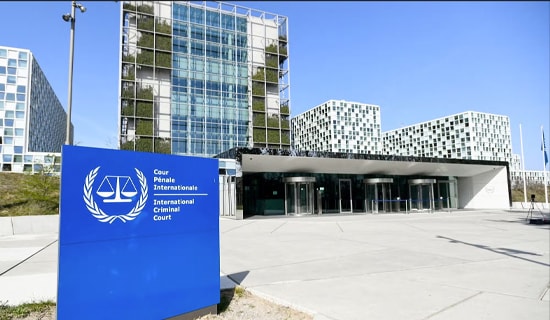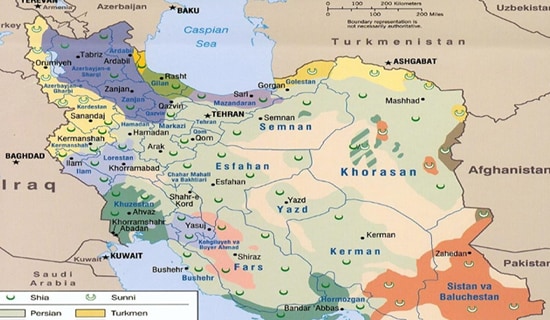The following report is now a complimentary offering from MEMRI's Jihad and Terrorism Threat Monitor (JTTM). For JTTM subscription information, click here.
The military activity of the Islamic State's "Sinai Province" has attracted much global attention. In its war against the Egyptian regime, the Islamic State (ISIS) has managed to deal significant blows to the largest and best-equipped Arab army and disrupt the Egyptian economy. It also managed to carry out attacks that made an international impact, chiefly the downing of a Russian airliner. However, ISIS represents an overarching philosophy that goes beyond a purely local military conflict. This organization is waging an all-out war to topple the existing order and replace it with a different political, social and religious order. In order to realize this vision in Egypt, ISIS has set its sights on Sinai, and in order to establish itself there, it must foster good relations with the local population and present itself as a worthy alternative to the regime.[1]
Establishing itself in Sinai is now more important to ISIS than ever, in light of its defeats and loss of territory in its major strongholds in Syria and Iraq. Gaining a foothold in Sinai will enable it to develop the peninsula as an alternative to lost territory and as a gateway to Egypt and North Africa, as well as to Israel, Gaza, Jordan, and Saudi Arabia.
This series of articles seeks to set aside the military dimension of ISIS's Sinai Province and focus on other aspects of its activity, namely its attitude and conduct vis-à-vis local residents.
The first part of the series will discuss the complex ties between Sinai Province and the locals. ISIS leaders in Sinai make an effort to handle tribesmen with respect and to paint themselves as a force protecting Sinai residents from the Egyptian government's injustice. Such diplomacy on the part of the organization is necessary since tensions exist between ISIS and locals, in part due to the fact that many ISIS members come from outside Sinai, and also because the organization wishes to impose a different worldview than that of the locals. The relations are also strained by the many executions of locals whom ISIS suspects of aiding security forces.
The second part in the series will discuss ISIS's efforts to demonstrate its control of the territory and to enforce Islamic laws according to its view. ISIS considers certain areas of northern Sinai to be a part of its Islamic caliphate and argues that Islamic law applies there. The organization recently published a video showing its members enforcing religious law in the peninsula. The video documents ISIS operatives destroying television sets, penalizing cigarette and drug smugglers, persecuting Sufis, and more; it highlights the organization's relative freedom of action in a manner meant to embarrass the Egyptian government and portray Sinai Province has having effective control on the ground.
The third part of the series focuses on ISIS's attempt to spread its religious worldview among the locals and impose its ideology on them. Most of the activity of the Sinai Province in this field involves measures against the Sufi sect, which it portrays as part of its campaign to cleanse Islam of polytheism and idolatry.
ISIS Sinai And The Local Tribes
Radical Islamists began operating in Sinai and spreading Salafi ideology among the locals as early as the 1970s and 1980s. In the early 2000's, jihadi groups began operating organized cells in the peninsula under the umbrella organization Al-Tawhid Wal-Jihad, and carried out large attacks on tourist destinations, doing severe damage to the Sinai economy. Although the Egyptian regime managed to eliminate this group almost entirely, after the 2011 revolution and the ouster of Mubarak jihadis exploited the instability in the country to established Ansar Bayt Al-Maqdis, which was bolstered by activists released from prisons, weapons that flowed from Libya, and ties to Salafi-Jihadis in Gaza. In 2013, Ansar Bayt Al-Maqdis launched an all-out war on the Egyptian regime, and in 2014 it joined ISIS and swore fealty to its leader Abu Bakr Al-Baghdadi.
Jihadis, then, have been active in Sinai for decades. Embedded in the population and well-acquainted with its social structure, they are highly aware of the importance of fostering relations with the locals, many of whom are Bedouin tribesmen, in their areas of operation in Rafah, Sheikh Zuweid, and Al-'Arish. ISIS sees the tribesman not only as a source of manpower and an element that could help or hurt the organization, but also as subjects of its "caliphate," like other Sinai residents. Accordingly, ISIS Sinai activists engage in targeted propaganda efforts vis-à-vis the Bedouin population and constantly work to deepen ties with them. ISIS has a complex view of the local residents and tribesmen; its attitude towards them is generally positive, but this is accompanied by patronizing, coercion and daily acts of aggression against them.
Official ISIS publications and social media posts always address Sinai residents pleasantly and respectfully. They praise their adherence to Islam and to the core values of Bedouin society, and use the local population's rage at the regime's injustices and failures to garner support for ISIS and recruit members to its ranks. However, a closer examination reveals tensions between the local population and ISIS. This is due to the fact that many ISIS members, including the current "governor" of the Sinai Province,[2] are not Sinai natives,[3] and also to the fact that Sinai Province fights the Egyptian regime with no regard to the local population, and is even willing to harm their livelihood to promote its interests and values.
Another source of tension is the many executions of local residents on charges of collaborating with Egyptian or Israeli intelligence services and other security forces. It should be mentioned that ISIS views the Egyptian regime and its leaders, as well as Egyptian security forces, as apostates. The organization stresses to Sinai residents that anyone collaborating with the Egyptian authorities, even minimally, is considered a traitor and condemned to die. ISIS operatives treat suspected collaborators with unhesitating brutality, even though they are aware that this could enrage the locals and trigger blood feuds.
The tension is also apparent in ISIS's patronizing treatment of tribesmen. A video recently published by ISIS Sinai, titled "The Light of Shari'a," clearly reflected this attitude by condemning tribal traditions and stating that relying on them as a source of authority and arbitration between tribes is considered heresy.[4]
In recent days the tension between the Sinai Bedouin and ISIS peaked as armed clashes broke out between members of the Tarabin tribe and ISIS operatives (see details below).
The following are examples of this complex attitude:[5]
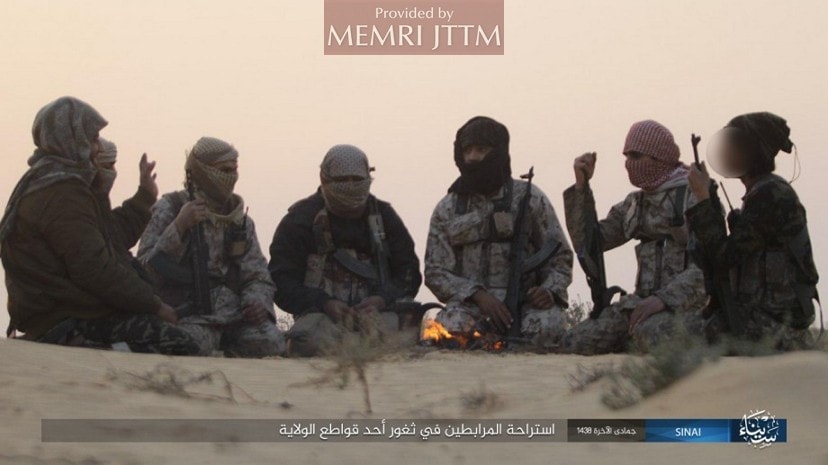
ISIS Sinai activists brewing tea around a campfire. This image is meant to portray ISIS as having freedom of action and movement in Sinai, and show them conducting a Bedouin lifestyle.
Sinai Province Governor On Sinai Locals: "Manliness Is Their Nature, And Honor Is Their Character"
ISIS Sinai "governor" Abu Hajar Al-Hashemi demonstrated the group's positive and welcoming attitude towards Sinai residents in an interview in ISIS's weekly news bulletin Al-Naba'. Abu Hajar praised the people of Sinai, stating that they possess manliness and honor – core values in Bedouin society. He added that his fighters defend the locals' reputation against the regime and army's attempts to besmirch them. Asked whether Egyptian authorities have attempted to recruit Sinai residents to establish militias to fight ISIS, and how his men dealt with this phenomenon, Abu Hajar said: "In truth, Sinai residents have a unique nature. Manliness is their natural disposition, and honor is their character. Resentment of and distance from obscenities is in their nature. This is how they are in general, let alone when the religion comes along and they adopt it. They were the best in the [pre-Islamic age of] jahiliyya, and are the best in Islam if they study it properly. Even among [the locals] who are not our men, we do not find any sahawat[6] [anti-ISIS militiamen] or spies, aside for [individuals who are rare] like a white hair on a black bull – and these we quickly pluck out. Praise Allah, the mujahideen in Sinai deal with any initiative to establish a sahwa by beheading it quickly. We do not permit any weed to grow and branch out.
"We will not neglect to mention that liars among the officers and soldiers of the army of apostasy [the Egyptian military] wished to blacken the reputation of the people of Sinai in order to cover up their own defeat and disaster by repeating the false claim that the Sinai tribes stand with them. [But the fact is that] none of the men of Sinai have stood with them, aside for dead pack animals. It will not be long until we dispatch them to join their [dead] brothers whom Allah has already enabled us to reach and whom we made a lesson of for others..."
Abu Hajar declared that ISIS Sinai was the Sinai residents' protective shield and that his men give their lives for them. He called on them to join its ranks, saying: "We tell [the apostates]: blood for blood, destruction for destruction. [We give our] necks for your necks. [We swear that] so long as there is blood in our veins, the apostates [Egyptian security forces] will not reach you. We swear to Allah that we will remain a bone stuck in the throat of all apostates, and will even be in their nightmares when they sleep. Expect good tidings that will make you joyous. We advise them [the people of Sinai] and us to fear Allah and hold fast to the rope given by Allah,[7] and join the caliphate bases in Sinai Province to prepare religiously and militarily to fight the apostates under the banner of the imam from the Quraysh tribe [Abu Bakr Al-Baghdadi].[8] None of them should die without swearing an oath of fealty [to Al-Baghdadi]. None of them should die [without fighting].[9] I hereby warn them of the propaganda of the apostate brothers [meaning the Muslims Brotherhood] and the fatwas issued by the tyrants' clerics [meaning establishment clerics for Arab regimes]. Those [clerics] will not leave any Muslim man or woman alone without trying to divert them from the Islamic religion to the religion of tyrants and from the collective of Muslims to the sects of the misguided, if they are able to. Stand fast and know that the sword is the shield."[10]
Addressing Sinai Population, Usually Pleasantly
ISIS propagandists on social media have joined efforts to foster good relations with the local Sinai population. One of these propagandists, Abu Ubaidah Al-Muhajir, wrote on a pro-ISIS Telegram channel: "Who defends the Muslims in Sinai? Why do the Sinai tribes embrace ISIS fighters? ... ISIS is the one who protects Muslims in Sinai. Many operations against the apostates [i.e. the Egyptian army] were postponed because one of the common folks was passing through the area of the attack. Moreover, in one case, a soldier of the caliphate threatened one of the common people with a weapon and forced him to get out of his car. When the ISIS governor found out about this, he ordered to flog this soldier in public in one of the markets, and the [Sinai Province's] Islamic court ordered a payment of 50,000 Egyptian Pound to the man... Such a state with lofty aspirations – how can anyone fail to embrace it and swear fealty to it in order to fight for the sake of Allah?"[11]
The post refers to an incident that occurred about a year ago, which reflects ISIS Sinai's efforts to preserve their image as friendly and fair towards the residents. In March 2016, an ISIS fighter manning a roadblock forced a resident of the village of Al-Barath south of Rafah to exit his car at gunpoint. The incident enraged and offended locals, and a week later, a large group of armed men came to the village to set the record straight. The armed men gathered the villagers, and their commander forced the fighter to apologize to the resident. The commander then had the soldier flogged and informed the resident that the Sinai Province shari'a court had ordered to compensate the resident with 10,000 Egyptian lira.[12]
However, the tone taken towards Sinai residents is not always positive. In another post, Abu Ubaidah wrote: "A message to Egyptians in general and Sinai residents in particular: Sinai Province does not care who supports or opposes it. [Its men] remain loyal to the path until the Day of Judgment. Allah's Messenger said about them: 'They are unharmed by their opponents or those who abandon them.' They do not need your support. This message is addressed to anyone who questions the mujahideen in Sinai."[13]
Tribal elders in Sinai presented as apostates in a video released by ISIS Sinai Province
Exploiting Residents' And Tribesmen's Negative Feelings Towards Egyptian Authorities And Army
ISIS activists on social media frequently exploit the Sinai residents' bitterness and anger at authorities in order to garner their support and portray ISIS as the only element that is truly concerned with their fate.
One recent example: On January 13, 2017, the Egyptian Interior Ministry announced that antiterrorism forces had killed 10 ISIS terrorists in a raid on an apartment in Al-'Arish in Sinai. According to the statement, the men who were killed were responsible for a deadly attack on a police post in the city one week prior. Al-'Arish residents were furious at the killing, claiming that the 10 men were not terrorists but innocent civilians. They held a protest rally and threatened to launch a popular rebellion in response. ISIS members were quick to exploit the locals' anger and incite them against the authorities. They argued that the killing of the men proves the Egyptian government's hostility towards the locals, and attempted to convince the locals that ISIS was their defender and that they should join their ranks. A pro-ISIS post on Telegram stated: "Oh, youth of Sinai, and especially of proud Al-'Arish, raise the banner and join your brothers in Sinai Province, since other than Allah, no one [but them] is on your side. History will remember the position you displayed [at the protest rally]. Unite with the caliphate soldiers and never separate from them. Never let anyone order you to not escalate [your protest]. If you back down from avenging your religion and blood, next time the honor of your wives will be violated before your eyes. Obey only the laws of the Lord of the Worlds and join the caravan of the mujahideen. Follow only the blood of the pure martyrs. Obey only the voices and cries of the martyrs' mothers and wives. Anyone standing in your way is a traitor or an agent or a coward. Shame, shame on anyone who stands helpless or avoids doing his duty."[14]

Sinai Province vehicles near a campfire
Another ISIS media activist likewise welcomed the outrage of Al-'Arish residents, and expressed hope that it would strengthen Sinai Province: "After the savage expulsion [in 2013, when the Egyptian army evacuated north Sinai residents from their homes as part of its campaign against jihadis], the star of ISIS in Sinai rose, the oath of fealty [of Sinai jihadis to ISIS] was declared, and [ISIS's] power grew, praise Allah alone. Now we also see unfortunate events of the treacherous killing of ten youths in Sinai by the apostate army, on the grounds that they carried out the blessed jihadi actions which, praise Allah, caused heavy losses and damage to the apostate army. This led the treasonous army to kill these poor men in order to preserve its good name that was stained by the soldiers of the caliphate, may Allah strengthen it. Now we see that Sinai is rising up against the apostate government, which heralds a new victory. Open your eyes – we are opening our eyes as well."[15]
Executing "Agents" From Among Tribesmen
Sinai residents find themselves in the middle of an intelligence war between ISIS and Israeli and Egyptian security forces, a war in which kidnappings, assassinations, and ISIS executions of residents on suspicion of collaborating or spying have become common. In fact, ISIS Sinai frequently issues severe warnings to locals and publicly advertises the measures it takes against suspected agents or collaborators, while attempting to maintain proper relations with the tribes and be considerate of their practices and values.
A video circulated by ISIS Sinai on December 2016 showed the brutal execution of 15 Sinai Bedouins, and the confessions of some of the men who admitted to spying against ISIS. The video made sure to mention the tribal affiliation of each of the condemned, in order to embarrass and warn their fellow tribesmen. It underscored ISIS's ruthless treatment traitors and threated to do the same to other collaborators, while also portraying ISIS fighters as defenders of the population and partners of the tribes who share their respect for tribal values.
In one segment in the video, the narrator addresses the tribesmen respectfully, saying: "Oh, our men in Sinai, oh the tribes of nobility and pride! The mujahideen were and still are your defending armor and your mighty fortress that protects you, your blood, and your honor. Fear Allah with regards to your religion and faith. Fear Allah with regards to standing with the mujahideen and aiding them. Beware of falling into the [Egyptian] army's snares and traps, which it deploys in front of and under the supervision of the Jews. The latest trap is the attempt to draw some tribes, incite them, and seduce them into establishing sahawat [militias] of apostasy and treachery in order to fight the mujahideen with unfounded pretexts. We warn you against falling into these traps. No matter how they are set up for you, they are actually illusions inspired by Satan. As far as we are concerned, a spy is anyone assisting the Egyptian or Jewish army in their war against the Muslims, even by providing one sip of water, having one conversation, or giving any info whatsoever. While treason is considered a despicable and contemptable act in the tradition of the local tribes, it is totally forbidden in the shari'a of our Lord. Those who do it are considered apostates against Islam, having committed one of the transgressions that exclude [one from the fold of Islam], and the punishment for them is death. You must adhere to the shari'a of our Lord."[16]
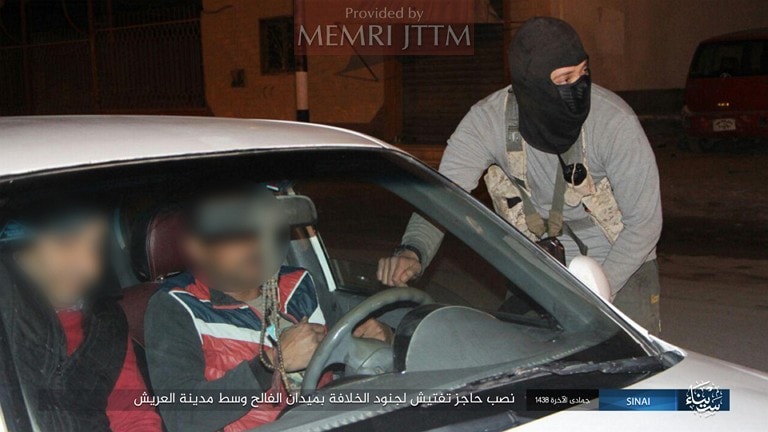
Surprise ISIS checkpoint in Al-'Arish
A source in Sinai Province's security apparatus said, in an interview with the ISIS weekly Al-Naba', that the efforts to deal with collaborators stem from a desire to protect Sinai residents, who are "subjects" of the Islamic State: "In light of the fierce effort by Sinai Province to fight the tyrants of Egypt and their apostate forces on one hand, and the Jews in Palestine on the other hand – at a time when the apostate sects and cults are ganging up on the Islamic State – it is our duty to engage in security efforts to preserve the safety of the mijahideen, and of the subjects of the Leader of the Believers."[17]
Pro-ISIS information activists also take part in efforts to justify the brutal execution of tribesmen accused of collaboration. Recently, after the charred body of Sheikh Zuweid resident Ahmad Al-Jaratli was found West of Rafah, one information activist clarified that his execution was based on the principle of measure for measure: "[To the] tribes: Regarding the apostate Ahmad Al-Jaratli, who was burned yesterday by the soldiers of Sinai Province... The reward should befit the act, so they first gouged out both his eyes, since he had spied for the Jews. Then they burned him, because he had brought about the burning of our mujahideen brothers."[18] Al-Jaratli was accused of providing information to the Israeli intelligence services that enabled them to target a vehicle carrying ISIS operatives in an airstrike.
Hatem Al-Balak, a social activist from north Sinai, stressed that ISIS heeds tribal customs when executing collaborators, in order to avoid sparking blood feuds: "The organization defers to tribal [customs] in the act of killing, in the sense that if it condemns someone to death for collaborating with security forces, then the execution is carried out by a member of his tribe, so as to not give the event a tribalist nature. If the execution is carried out by an armed man from another tribe, the dead man's tribe will seek to avenge him by killing a member of the executioner's tribe."[19]
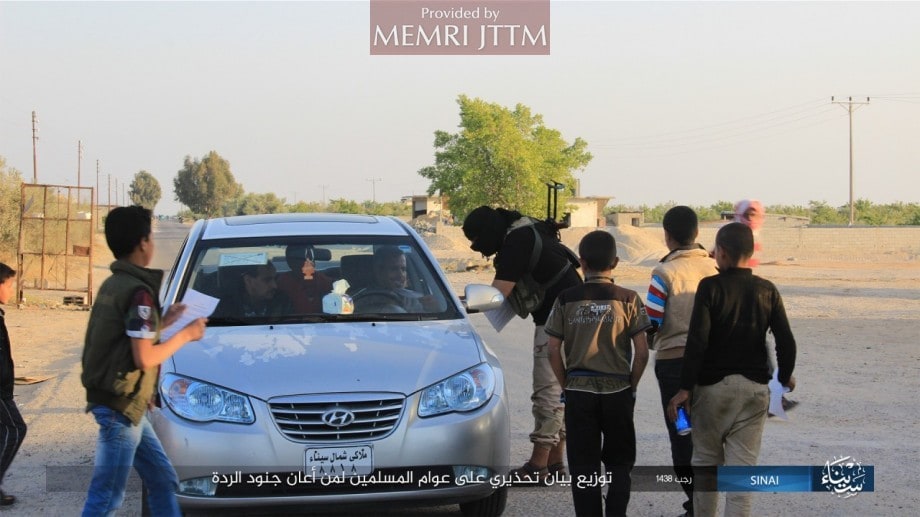
ISIS Sinai members distribute flyers warning residents to not collaborate with security forces
Clashes With The Tarabin Tribe
In mid-April, armed clashes erupted between members of the Tarabin tribe and ISIS operatives. It appears that hostilities broke out over ISIS's continuing efforts to impede the tribe's cigarette smuggling activities. ISIS members kidnapped and flogged several tribe members who were smuggling cigarettes to Gaza and burned their vehicles. They also fired an RPG at a building which belongs to the Tarabin in the village of Al-Barath, south of Rafah. In response, On April 16, 2017, Tarabin tribe members surrounded Al-Barath, combed it for ISIS members and captured three of them, one of whom was released.
On April 25, 2017, ISIS reportedly detonated a car bomb at a checkpoint set up by the Tarabin, killing four people. This prompted the tribesmen to execute one of the remaining two captives by burning him alive. A video circulated on social media allegedly shows the execution.[20]

A supporter of ISIS-Sinai who identifies himself as Abu Sumiyyah Al-Masri tweeted that ISIS would take revenge on the Tarabin tribe and threatened that their fate will be similar to that of the Shu'aytat tribe in Syria, hundreds of whose members have been massacred by ISIS.[21]

* R. Green is the director of MEMRI's Jihad and Terrorism Threat Monitor Project.
[1] For more, see "New Masters of Revolutionary Warfare: The Islamic State Movement (2002-2016)" by Craig Whiteside, Perspectives on Terrorism, Vol. 10, No 4 (2016).
[2] ISIS sees itself as a proper state, and is accordingly divided into geographic units known as wilayat (provinces). Each province is led by a "governor," who is in charge of various councils and departments responsible for military activity, media, internal security, preaching, external relations, income, justice, etc.
[3] The previous leader of ISIS Sinai, Abu Duaa' Al-Ansari, who was killed in the summer of 2016, was a Sinai local, to judge by his nickname Al-Ansari. (In early Islam the term ansar, meaning "supporter," was given to the residents of Al-Madinah who supported the Prophet Muhammad, while those who came with him were called muhajirun "migrants." In current jihadi parlance the name Al-Ansari therefore designates a local fighter, as opposed to foreign fighters, who often use the nickname Al-Muhajir).The identity and origin of the current governor, Abu Hajar Al-Hashemi, are unknown. The news website Al-Bawaba reported that Al-Hashemi is Palestinian, while the UAE website 24.ae claims that he is an Iraqi who served as an officer in Saddam Hussein's army and was one of the first members of Al-Tawhid Wal-Jihad in Iraq – the antecedent of ISIS. Albawabhnews.com, January 3, 2017; 24.ae, December 26, 2016.
[4] The video "The Light of Shari'a" features ISIS's efforts to enforce Islamic law and its worldview on locals in Sinai. It will be discussed in the coming parts of this series. Telegram.me/Wikalat Nasher News, March 29, 2017.
[5] For more on ISIS Sinai ties with the local population, see MEMRI Inquiry & Analysis No. 1201, ISIS In Sinai Increases Military, Propaganda Pressure On Egypt, November 8, 2015.
[6] Sahawat - ISIS pejorative term for Sunni militias that fight against them. Named after the "Awakening" movement of Iraqi tribesmen who fought against ISIS in the previous decade.
[7] A reference to Koran 3:103, which calls for Muslim unity: "And hold firmly to the rope of Allah all together and do not become divided."
[8] The full name of the ISIS leader is Abu Bakr Al-Baghdadi Al-Husseini Al-Qurayshi – a name reflecting Al-Baghdadi's claim that he is a descendant of the Prophet Muhammad.
[9] A reference to a hadith stating that "anyone who dies without waging jihad or thinking about it, has died on the branch of hypocrisy [Sahih Muslim 3533]." Meaning that those who sit at home and do not join the battle are hypocrites (munafiqeen).
[10] Al-Naba' 60, December 12, 2016; p. 8-9.
[11] Telegram.me/Misr Al-Muhtalah, January 5, 2017.
[12] Twitter.com/newsinai24, March 13, 2017.
[13] Telegram.me/'Ajel min Sinaa', February 2, 2017.
[14] Telegram.me/Misr Al-Khilafa, January 15, 2017.
[15] Telegram.me/maseralknanaa, January 15, 2017.
[16] Dawaalhaq.com, December 12, 2016.
[17] Al-Naba' 70, March 1, 2017; p. 15.
[18] Telegram.me/'Ajel Min Sina', February 27, 2017.
[19] Al-Hayat (London), March 6, 2017.
[20] Facebook.com/AJA.Egypt, April 25, 2017.
[21] Twitter.com/GDKBAW_, April 26, 2017.



